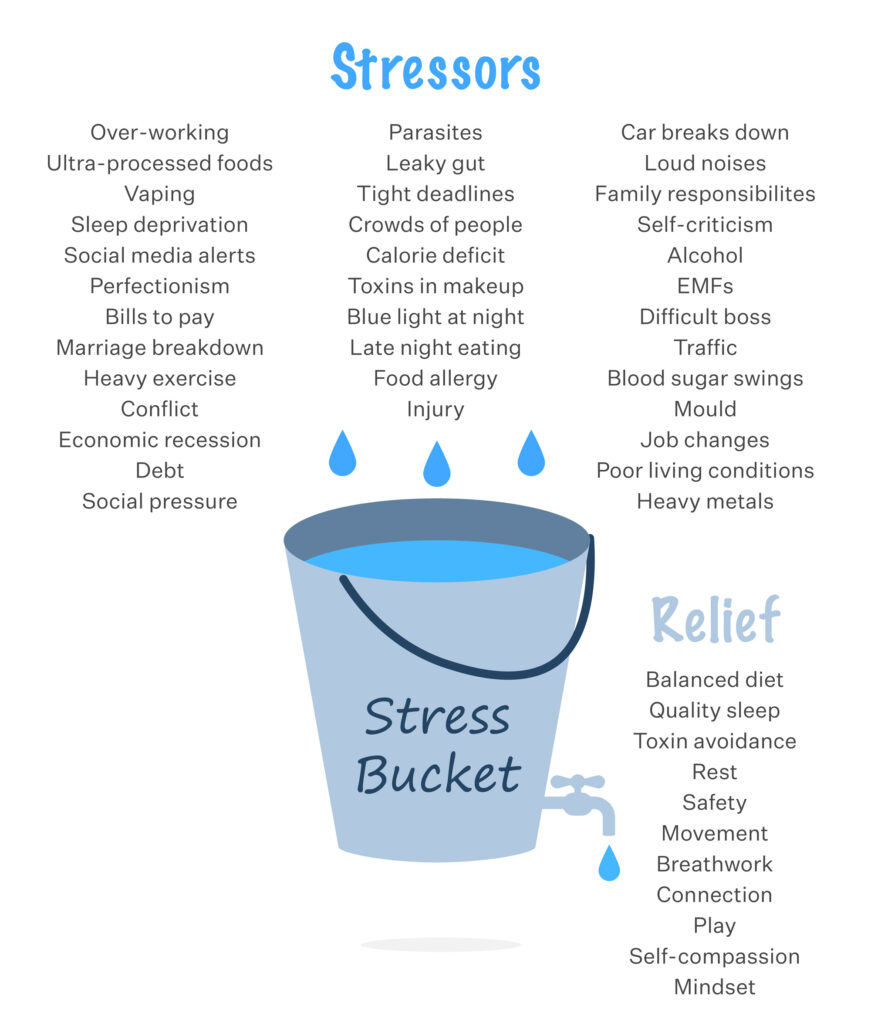You know that moment when a colleague asks a simple question and you want to snap? Or when you’re staring at your inbox and feel tears prickling behind your eyes, even though it’s just an email?
When you cancel plans again because you simply can’t muster the energy to show up and be “on,” then lie awake at 2 AM feeling guilty about it?
If that resonates, please know, you’re not failing at adulting. What you’re feeling is your nervous system running on overdrive.

Day in the life of nervous system overload
Here’s what your day probably looks like:
You wake to notifications already pinging. Before your feet even hit the floor, you’re mentally running through your meeting schedule, that presentation deadline, the project that’s stalled, whether you replied to that urgent email from last night.
You show up to work, juggle competing priorities, navigate office dynamics, make dozens of micro-decisions, hold space for others’ emotions while regulating your own. You smile through the tension, stay composed during challenging conversations, and radiate competence even when you feel anything but.
Then you come home (or close your laptop if you work remotely) to more—meal decisions, household tasks, maybe caregiving responsibilities, the mental load of managing a life. The invisible labour no one sees and everyone assumes is just… handled.
And somewhere in all of this, you’re meant to work out, maintain a social life, pursue personal growth, and maybe even have a hobby?!
Is it any wonder the smallest thing–a spilled coffee, a cancelled appointment, a one-line text that hits wrong–can suddenly feel like the thing that breaks you?
Your nervous system wasn’t built for this
We’re walking around with the same primitive nervous system our ancestors had thousands of years ago–designed for short bursts of danger, like escaping a predator or surviving the cold.
Back then, stress came, the body responded, and once the danger passed, everything reset.
Today, there’s no off switch.
From the moment we wake, we’re hit with notifications, deadlines, noise, news, responsibilities. Our nervous system can’t tell the difference between a tiger and an overflowing inbox: it simply registers threat.
So the stress response kicks in again and again: heart rate up, stress hormones released, muscles tensed.
And because there’s rarely a moment of true safety or completion, the body stays stuck in survival mode.
🍃˚.⛰️⋆☁️ You’re not constantly stressed because you can’t handle normal life — you’re constantly stressed because your body is experiencing dozens of stress activations every day, with no chance to complete the cycle and return to calm. 🍃˚.⛰️⋆☁️
Your stress bucket is overflowing
Think of your stress like a bucket. Yes, mental and emotional stress is adding water to the bucket, but there are many other hidden stressors that are contributing too! Physical, chemical and dietary stressors.
If you’ve got holes in the bottom (healthy outlets like rest, movement, laughter, connection, nourishment), the water drains and you cope just fine.
But when the bucket fills faster than it empties, it overflows.
And when that happens, symptoms emerge: fatigue, brain fog, anxiety, irritability, bloating, low mood, PMS…. that sinking sense that you’re barely holding it together.
When you consider the stressors our ancestors faced–food scarcity, temperature extremes, predators–and compare that with the torrent of daily stressors we now face, it’s easy to see the evolutionary mismatch.

This isn’t a personal failure
If you’re reading this and feeling overwhelmed, please hear this clearly: This is not a personal failing.
You don’t need to “get your act together,” and you’re not weak because your colleagues seem fine (they’re probably not, by the way—they’re just hiding it better 😉).
We’re living in a world that constantly demands more than our biology was designed to handle. And most of us were never taught how to discharge stress or support the body’s recovery systems.
So instead, we internalise it, until we can’t anymore.
Finding relief
Relief doesn’t come from pushing harder or “fixing” yourself. It comes from addressing all the reasons your bucket is overflowing–reducing what’s pouring in (including ALL of those hidden stressors!), enhancing your capacity to handle stress, and increasing your ability to drain it.
What does this look like?
♡ Stabilising your physiological foundation so your body isn’t in constant survival mode
Balanced blood sugar throughout the day so you have steady energy instead of crashes that feel like emotional crises, getting the nutrients you actually need to fuel healing processes, reducing toxin exposure to lighten the body’s burden.
♡ Honouring your body’s biological rhythms instead of forcing it to perform on demand
Exposure to natural light, eating in alignment with your cycle, movement that restores rather than depletes, genuine rest, and quality sleep that allows your brain to process the day’s stress rather than lying awake reviewing every interaction.
♡ Teaching your nervous system it’s safe through practices that help you complete stress cycles
Whether that’s breath work, literally shaking out tension, crying when you need to, laughing fully, connection with others, play, and even extending yourself some self-compassion (healing can’t happen in self-criticism).
♡ Shifting your relationship with stress itself
Learning to meet life’s demands without collapsing under them, recognising that feeling anxious or overwhelmed isn’t a character flaw but information, and understanding that rest isn’t something you earn, it’s how you sustain.
♡ Supporting the systems under the most strain
Like your adrenals when hormonal output has become dysregulated, and like your gut, which directly impacts your mood, energy, and immune function.
Further support
If you’re feeling overwhelmed right now, just remember: your bucket is simply full.
There’s nothing wrong with you–your body is asking for care, not criticism. With the right tools and support, you can re-teach your nervous system how to exhale again.
And if you need help finding where to start, and want guidance from someone who understands stress physiology intimately, I’d love to support you. Reach out for a 1:1 consultation here.
Hugs,
Lauren.

Feeling burnt out or off your game?
It might be low iron, B12, magnesium, zinc, or vitamin D. Watch Nutrient Foundations for Energy, Mood & Resilience to learn where to start.
X




Comments +